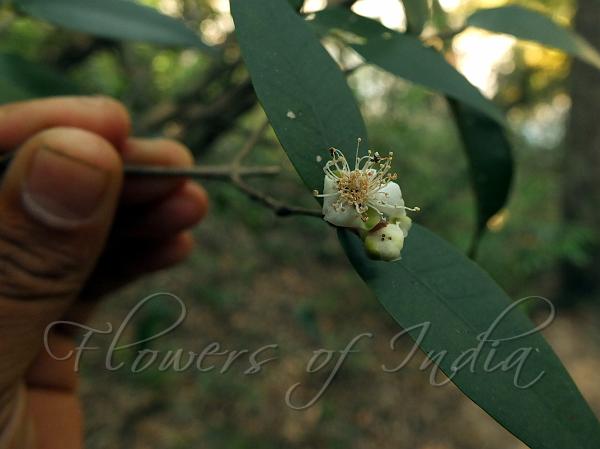|
| Jungle Guava |
|

|

| File size | 528306 |
| Original date | 2/14/16 3:03 PM |
| Resolution | 2048 x 1536 |
| Flash | Flash did not fire, auto |
| Focal length | 6.1mm |
| Exposure time | 1/160s |
| Aperture | 2.8 |
| Focus Distance | |
| Metering Mode | Spot |
| Camera make | FUJIFILM |
| Camera model | X-S1 |
| Sensor type | OneChipColorArea |
|
|
|
|
Photo: |
Botanical name: Eugenia singampattiana Family: Myrtaceae (Bottlebrush family)
Jungle Guava is a critically endangered small
evergreen medicinal tree, with branchlets round, hairless. This species
is categorized as endangered or possibly extinct by Botanical Survey of
India. It was named after the Singampatti Hills in Tamil Nadu. Leaves are deccusate, 5-8 x 2.5-5 cm, ovate or elliptic-oblong,
papery, nerves 13-15 pairs, midnerve prominent below, hairless, base
heart-shaped or rounded at base, margin entire, blunt or tapering at
tip; leaf-stalk very short. Cymes at branch-ends in short racemes;
bracts and bracteoles velvet-hairy, 0.8-1 cm long; flower-stalks to 1
cm long. Flowers white. Calyx tube 3 mm long, lobes 4, to 4 mm long,
sub-round, persistent. Petals 4, glandular, to 12 mm long, ovate,
inprominently dotted and prominently nerved. Disc small. Stamens
numerous, erect or incurved; filaments 1-1.5 mm long. Ovary
subspherical, 2-celled; ovule numerous; style 8 mm long. Fruit is a
nearly spherical berry, 2 x 2 cm, crowned with sepals.
Medicinal uses: Jungle Guava is known to the
locals as “Kattukorandi”; they use this plant to get relief from
toothache, digestive problems, asthma, giddiness, body pain,
rheumatism, gastric complaints and also as mouth freshener. A paste
prepared from equal quantities of leaves and flowers are consumed to
cure body pain and throat pain and tender fruits are consumed to relief
from leg sores and rheumatism. A paste, prepared from equal quantities
of stems, leaves and flowers, is consumed with palm sugar to get relief
from gastric complaints.
Jungle Guava is known to the
locals as “Kattukorandi”; they use this plant to get relief from
toothache, digestive problems, asthma, giddiness, body pain,
rheumatism, gastric complaints and also as mouth freshener. A paste
prepared from equal quantities of leaves and flowers are consumed to
cure body pain and throat pain and tender fruits are consumed to relief
from leg sores and rheumatism. A paste, prepared from equal quantities
of stems, leaves and flowers, is consumed with palm sugar to get relief
from gastric complaints.
Medicinal uses:
 Jungle Guava is known to the
locals as “Kattukorandi”; they use this plant to get relief from
toothache, digestive problems, asthma, giddiness, body pain,
rheumatism, gastric complaints and also as mouth freshener. A paste
prepared from equal quantities of leaves and flowers are consumed to
cure body pain and throat pain and tender fruits are consumed to relief
from leg sores and rheumatism. A paste, prepared from equal quantities
of stems, leaves and flowers, is consumed with palm sugar to get relief
from gastric complaints.
Jungle Guava is known to the
locals as “Kattukorandi”; they use this plant to get relief from
toothache, digestive problems, asthma, giddiness, body pain,
rheumatism, gastric complaints and also as mouth freshener. A paste
prepared from equal quantities of leaves and flowers are consumed to
cure body pain and throat pain and tender fruits are consumed to relief
from leg sores and rheumatism. A paste, prepared from equal quantities
of stems, leaves and flowers, is consumed with palm sugar to get relief
from gastric complaints. | Identification credit: Siddarth Machado | Photographed in Kalakkad Mundanthurai Tiger Reserve, Tamil Nadu. |
• Is this flower misidentified? If yes,